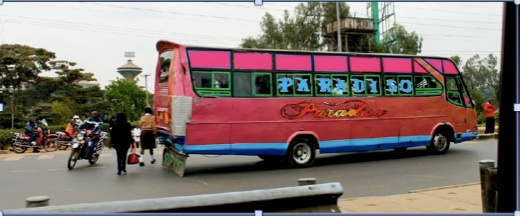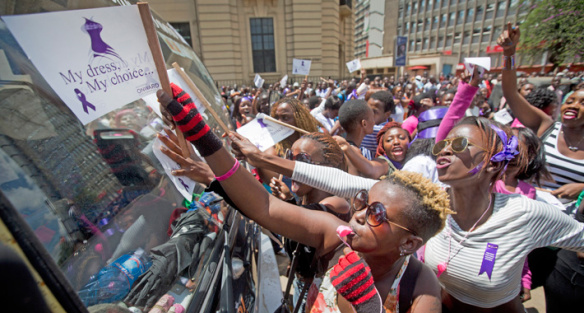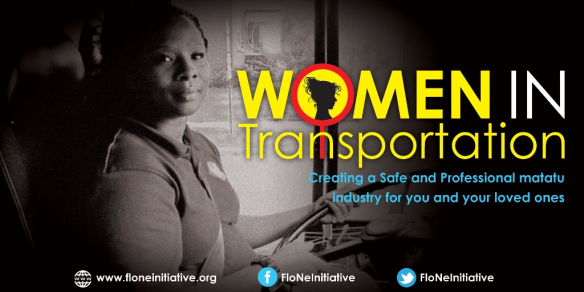Sexual harassment in public transport is a global problem. Kenya is no exception. Every day tens of thousands of women making trips in Public Service Vehicles (matatus) face unacceptable behavior from their fellow male passengers making mobility a dangerous and uncomfortable experience.
In an effort to make travel safer and more comfortable for women, one Kenyan organization, the FLONE Initiative, is combating sexual harassment on public transportation in Kenya . NPI bloggers Seth Kerr and Jacqueline Klopp conducted an extended interview with Naomi Mwaura, a co-founder of The FLONE Initiative. Naomi not only helps combat sexual harassment through this Initiative but is also committed to helping all people in Kenya have access to equitable transportation as a dedicated staff member for the Institute for Transportation Development Policy (ITDP) which recently set up shop in Nairobi.

Women rely on pubic transport and often face harassment Photo: courtesy Digital Matatus
NPI: How did the FLONE Initiative get started ?
I grew up watching my uncles’ work as public vehicle drivers, conductors and cleaners. From this upbringing, I did not see the matatu industry as a lost cause but as a misunderstood and neglected industry. My family grew financially through the industry. At one time, I was physically assaulted by public vehicle conductors while the rest of the public transport operators stood by and watched. How could I reconcile the two realities? As a result FLONE initiative came into being. For several years, through FLONE Initiative, I have been working with the main aim of improving the lives of public transport operators, creating safe spaces for women in the public transport network and changing the matatu industry for the better.
NPI: What are the overall goals of the FLONE Initiative?
a. To be the premier workforce development organization for public transport workers.
b. To Prevent sexual harassment and violence in the Kenyan public transport industry
c. To be the leading authority on the status of women in transportation
NPI: What are the details of the FLONE Initiative’s Public Safety Certification Program?
The public safety certification program trains public transport providers on prevention of sexual violence, gender equality, customer service and on personal and professional development. Another focus area is increasing reporting of sexual violence through the use of a crowd mapping platform and SMS reporting platforms. We also strive overall to create awareness on the prevalence of sexual violence meted against women in the Kenyan public transport network.
NPI: How many people working in the public transportation sector has your initiative trained so far?
The FLONE Initiative has so far trained 312 public transport workers in Bungoma, Githurai 45, Kisumu, Nyeri and Nakuru. These are public transport networks with most recurring incidences of violence.
NPI: What are the biggest challenges facing women who use public transport in Kenya?
Transportation influences access to education, jobs, health services and social activities. Men are more likely to have access to private means of transport than women. Thus, making public transport safe for the women and girls will enable women to easily get access to services whenever they need to. For instance a woman can attend evening classes without fear of victimization while using public transport.
NPI: What has the response been from the transportation sector?
Many have embraced the initiative and are very much willing to work with us while others feel it a lost battle.
NPI: How have women responded to your organization’s efforts?
Response so far is very positive since many view the program as a solution to a problem that has been affecting them for such a long time.

Kenyan women protest against violent sexual harassment See the story by Esther Wanjiku here
NPI: How can women report the sexual harassment they face?
By alerting the Initiative website on the Ushahidi platform or by simply calling the helpline No.1195
NPI: How effective has the police system and judicial system been in combating sexual harassment? Do perpetrators face justice in Kenya?
There are currently 6 public transport operators in jail for stripping a lady in Kayole. The victim forgave the perpetrators and made a formal request to withdraw the case but the DPP intervened stating that the case was a matter of public state hence, could not be withdrawn by the victim. There are 5 perpetrators in court for sexually assaulting a lady by inserting a bottle in a matatu. In both of these cases, bail was denied. Sadly most of these incidences go unreported, and those that are reported lack enough evidence and/or follow-up to persecute perpetrators.
NPI: What are the main challenges the FLONE Initiative faces in combating sexual harassment in the public transportation sector?
Funding to implement and upscale the public safety certification program is the FLONE Initiative’s main challenge.
NPI: What would you like to see improved overall in the matatu sector from the perspective of women passengers and workers and what do you think the government needs to do to make these improvements?
That women and girls feel safe while using the matatus as well as more women venturing in the public transport industry for career opportunities. We commend the National Transport and Safety Authority (NTSA) efforts to ensure women’s safety and security in public transport by suspending SACCOs (matatu cooperatives) found guilty of harassing women. The government needs to ensure that matatu workers who are perpetrators of violence are seriously punished in accordance to the law. The perpetrators of uncouth habits should also be severely punished by denying them licenses to operate. Additionally, those doing well should be rewarded and used as models for the other.
NPI: Will Nairobi’s new Nairobi Metropolitan Area Transportation Authority (NaMATA) have any initiatives or resources to combat sexual harassment?
NaMATA through its partnership with the County Government of Nairobi hopes to improve and manage the transport systems to make it efficient, safe, reliable and sustainable. In regards to resources or initiatives to combat sexual harassment so far we are not aware of any.

NPI: What are some of your activities and how can people get involved?
Currently, we are implementing the Usalama wa Uma Program. The program engages public transport operators by offering trainings on gender equality and prevention of sexual violence, customer service, and in personal and professional development. Individuals and organizations can support us both in kind and financially. Moreover, by working together to stop perpetration of harassment as it occurs on the streets and matatu terminals will be of such great help. We are also implementing the Women In Transportation Program (WITrans). WITrans aims to identify and bridge workforce gap in the transportation industry by promoting careers for women in the transportation industry. WITrans ultimately aims to attract, retain and advance women in the transportation industry.
NPI: Is the Flone Initiative partnering with any other organizations attempting to combat sexual harassment too?
Yes. Flone Initiative has partnered with Men Engage Kenya Network (MENKEN) to train public transport operators on gender and sexuality and on prevention of sexual harassment.
With sexual harassment of women happening across so many differentiating factors like nationality, ethnicity, race, religion and age, what do you believe the root causes of this behavior are? When men are taught to be dominant and aggressive, this often leads to negative masculinity as a result they tend to prove their prowess by harassing women and girls who are viewed as the weaker sex.
NPI: Are there other methods Kenyans should be utilizing to combat sexual harassment too?
Yes, by promoting men’s positive roles in preventing violence against women. Work with men and boys will need to be scaled up. To truly transform gender inequalities, we must go beyond scattered, small-scale interventions and efforts (no matter how effective), towards systematic, large-scale, and coordinated efforts.

Matatus and city streets should be safe for men, women and children. Courtesy: Reality Tested Youth Programme
NPI: What message do you have for the men reading this interview?
Don’t watch as a woman is being harassed and do nothing. Instead stand out and bring sanity to the situation. Remember this could be your sister, mother, wife or daughter. Together we can make the difference.
NPI:What message do you have for the women reading this interview?
Let us work together to ensure that the streets are safe for us and our daughters. Condemn the undressing vice whenever you see it happen. The public transport offers careers as any other sector, and it is high it we ventured into it boldly and fearlessly .
NPI: What does the future look like for the FLONE Initiative; what are the organizations goals for the coming years?
FLONE’s future is very bright,In the coming years, we hope to see the following: public transport certification incorporated in driving school curriculums, behavioral change in the power dynamics between men and women, more women venturing into the public transport workforce, structures in place to increase reporting and prosecution of sexual harassment cases, and finally that the success of Flone Initiative programs is replicated in other African countries.
For more information on the FLONE Initiative visit their website or join their facebook page
Naomi Wwaura can also be contacted at [email protected]
